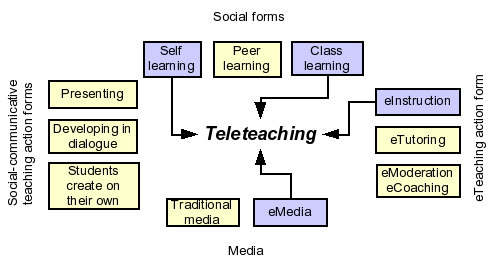Teleteaching: Difference between revisions
Jump to navigation
Jump to search
(using an external editor) |
m (→Technology) |
||
| (5 intermediate revisions by the same user not shown) | |||
| Line 1: | Line 1: | ||
{{Stub}} | |||
== Definition == | == Definition == | ||
* Teleteaching can be considered as a form of [[e-learning]] or [[distance teaching]]. Most often, it implements a sort of [[direct instruction]] approach. | |||
* Sometimes it also is used as synonym for educational [[videoconferencing]], i.e. as a component of a design, not a design by itself. | |||
== Teleteaching designs == | |||
A key feature of a teleteaching [[instructional design model]] is [[e-instruction]]. Teleteaching is most often done in a class context (i.e. learners connect at the same time and can interact with the instructor). But they also may choose to look at archived sessions they can download. In addition, each learner will have to work on his own. | |||
[[image:teleteaching.png|frame|none|Teleteaching according to the SCIL eLearning compontents framework]] | [[image:teleteaching.png|frame|none|Teleteaching according to the SCIL eLearning compontents framework]] | ||
Of course, such a instructional framework can be combined with others. I.e. it is possible to engage learners of a distance teaching class in other activities, e.g. collaborative work through a wiki. Modern instructional design models like [[4C/ID]] or [[First principles of instruction]] advocate the use of different strategies. | |||
== Technology == | |||
; For Videoconferencing | |||
* [[Videoconferencing]] and archives of sessions, e.g. Mpeg4, quicktime, breeze/flash formats | |||
* [[Screencast]]ing software (slides + voice over). | |||
; In addition | |||
* Various [[courseware]] (eMedia) | |||
* Learning platforms, such as [[LMS]]s or [[groupware]] | |||
[[Category: Instructional design models]] | |||
Latest revision as of 16:40, 3 November 2012
Definition
- Teleteaching can be considered as a form of e-learning or distance teaching. Most often, it implements a sort of direct instruction approach.
- Sometimes it also is used as synonym for educational videoconferencing, i.e. as a component of a design, not a design by itself.
Teleteaching designs
A key feature of a teleteaching instructional design model is e-instruction. Teleteaching is most often done in a class context (i.e. learners connect at the same time and can interact with the instructor). But they also may choose to look at archived sessions they can download. In addition, each learner will have to work on his own.
Of course, such a instructional framework can be combined with others. I.e. it is possible to engage learners of a distance teaching class in other activities, e.g. collaborative work through a wiki. Modern instructional design models like 4C/ID or First principles of instruction advocate the use of different strategies.
Technology
- For Videoconferencing
- Videoconferencing and archives of sessions, e.g. Mpeg4, quicktime, breeze/flash formats
- Screencasting software (slides + voice over).
- In addition
- Various courseware (eMedia)
- Learning platforms, such as LMSs or groupware
